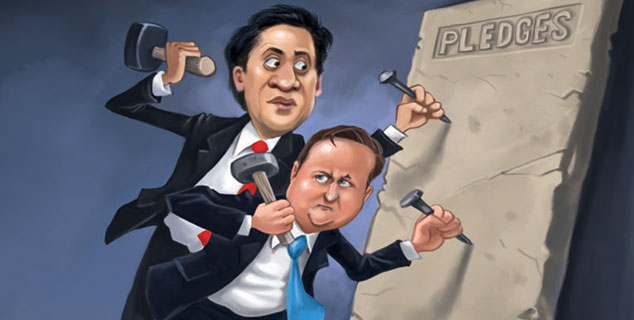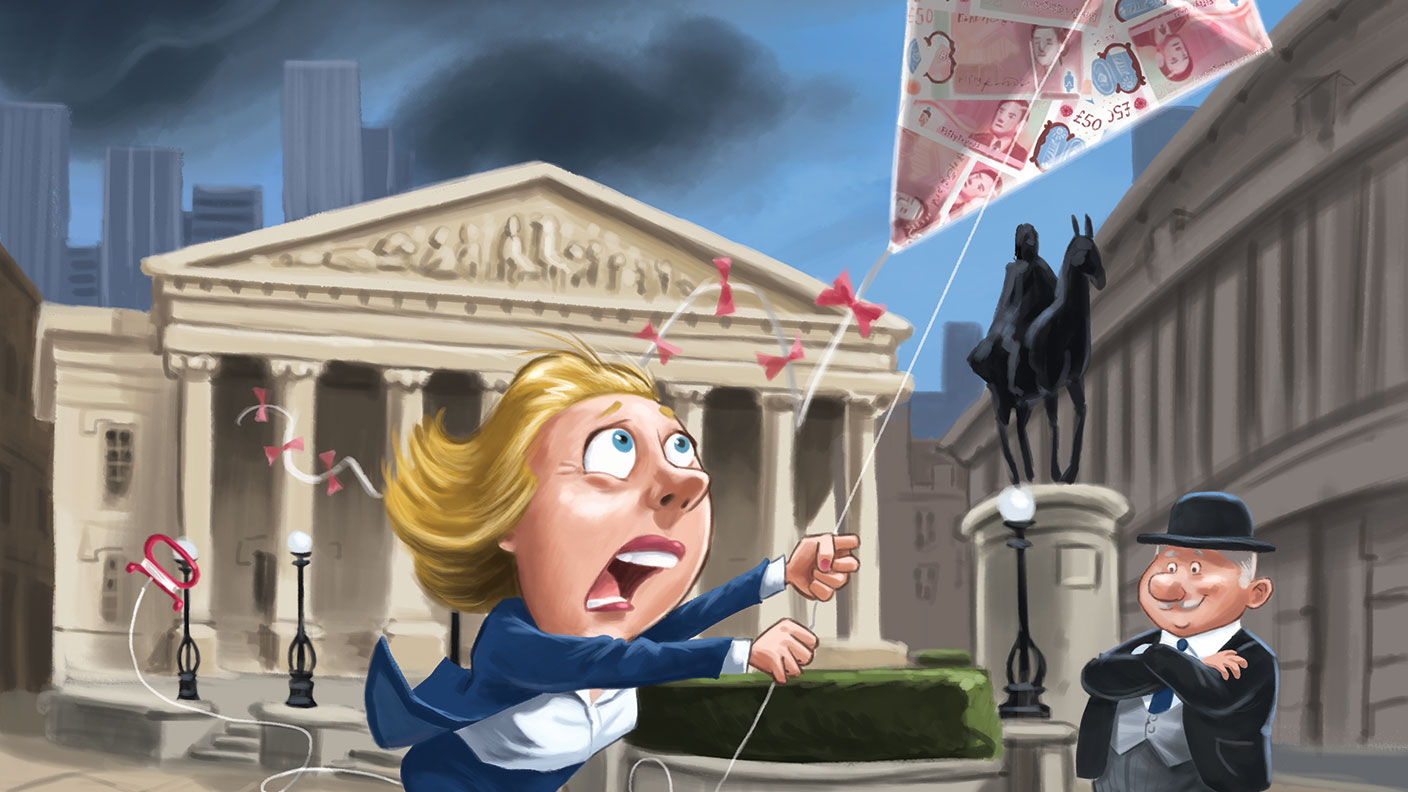What to expect after the election
Desperate last-minute vote-grabbing has muddied the waters. John Stepek peers through the murk.

Get the latest financial news, insights and expert analysis from our award-winning MoneyWeek team, to help you understand what really matters when it comes to your finances.
You are now subscribed
Your newsletter sign-up was successful
Want to add more newsletters?

Twice daily
MoneyWeek
Get the latest financial news, insights and expert analysis from our award-winning MoneyWeek team, to help you understand what really matters when it comes to your finances.

Four times a week
Look After My Bills
Sign up to our free money-saving newsletter, filled with the latest news and expert advice to help you find the best tips and deals for managing your bills. Start saving today!

As we go to press, the election result remains entirely unclear. Big stone tablets, interventions from celebrity chefs and reformed anarchists, laws banning tax hikes none of the desperate gimmickry of the last week has given either major party a discernible lead.
The choice should be straightforward, says Ed Conway in The Times. "There is more clear fiscal water between [the two parties] than at any election since 1983." Despite all the rhetoric over austerity we saw in 2010, the difference between the two parties is much greater now than it was then.
Labour "plans to borrow around £30bn a year more than the Tories by the end of the parliament". That presents "an unusually stark choice: vote Conservative and suffer deep, painful cuts to public services and benefits; or vote Labour and risk consigning future generations to lower living standards (for it will fall to them to pay off that extra debt)".
MoneyWeek
Subscribe to MoneyWeek today and get your first six magazine issues absolutely FREE

Sign up to Money Morning
Don't miss the latest investment and personal finances news, market analysis, plus money-saving tips with our free twice-daily newsletter
Don't miss the latest investment and personal finances news, market analysis, plus money-saving tips with our free twice-daily newsletter
Yet the parties' desperate vote-grabbing has muddied the waters. No party has been especially forthcoming on its spending plans, as the arbiter of such things, the Institute for Fiscal Studies think tank, has bemoaned. And they've all made "confusing and self-contradictory" promises, as Conway puts it.
The Tories have said they won't raise any of the main taxes, making it harder to meet their promise to run a budget surplus by 2018/2019; Labour's "Budget Responsibility Lock" commits it to cutting the deficit (as a percentage of GDP) every year.
And both parties have promised to spend more on the NHS and to protect both pensioners and the education budgets to one extent or other, which leaves the burden of deficit reduction on cutting from unprotected departments, and raising suspiciously optimistic amounts of money from "tax avoiders" (see below).
As Janan Ganesh despairingly put it in the FT this week: "A country that has not balanced a budget since 2002 has developed the bravado of a country with a sovereign wealth fund, forever arguing with itself about how to use surplus revenue that does not exist."
The realities
As a result of all this, Roger Bootle and Jonathan Loynes at Capital Economics argue that in practice there is less "clear blue water" between the parties on the deficit than it might appear. On the one hand, any growth benefits implied by Labour's plans to cut the deficit less rapidly than the Conservatives "could be largely offset by an adverse market reaction to signs of a weaker stance towards deficit reduction", which would drive up Britain's borrowing costs particularly given that "Labour's relatively poor record for deficit reduction means that the market could treat its extra borrowing differently to that undertaken by other parties".
As for the Tories, they "may struggle to cut... spending as much as they propose". Under the Tories, public spending would fall from 41% of GDP today to 36% by 2019/2020 (where it was in the late 1990s), whereas under the other parties it falls back to 38%. But that would require knocking 18% (in real, after-inflation terms) off unprotected departmental budgets during the next parliament.
The trouble is, Britain does need to tackle the state of its balance sheet. The public-sector deficit came in at 5.7% of GDP in 2014, according to the Office for National Statistics. Meanwhile, our overall national debt came in at £1.6trn (you may vaguely remember the headlines when it first hit £1trn that was back in 2012). It now stands at just under 90% of GDP.
So money is going to remain tight over the course of the next parliament. And as we all know from experience, any sensible, calculating government front loads the pain. It gets the tax hikes and spending cuts over with in the first half of the parliament, so that the bribes can be wheeled out for when the next election rolls around. So whoever wins, taxes are likely to go up by more than the parties want to admit right now.
Constitutional upheaval
However, Bootle and Loynes remain upbeat on the UK's overall prospects, assuming the economy remains in recovery mode. "The UK's strong economic fundamentals should ensure it fares well under all but the most divisive governments. That said, bond yields and the pound could move sharply as the next government is formed."
Of course, the risk is that a divisive government is just what we'll get. As my colleague Matthew notes in the box below left, we might come out of this election with a coalition combination that we've never seen before. We might even face a second election the hurdles to such an event have been raised by the Fixed-term Parliaments Act, but it's by no means impossible.
The biggest wildcard is of course the Scottish National Party (SNP). Regardless of who wins, the SNP is now a major force in UK politics, and its key aim is to secure independence for Scotland. If Labour wins, it will likely be dependent on the SNP's goodwill.
That's a double-edged sword, of course. The SNP can't play too fast and loose with Labour or it'll be accused of allowing the Tories to get back into power, and that would be politically toxic for the nationalists. At the same time, it's hard to see the SNP being happy without attaining more powers of self-determination.
On the other hand, if the Conservatives get in, they may have no need to co-operate with the SNP but the SNP will also be able to rely on a lot more domestic support for a new referendum on independence, particularly if English Votes for English Laws, or the referendum on Europe become big issues (Scotland can argue that it doesn't want to leave Europe). So regardless of who gets in, we are going to see constitutional upheaval. In fact, we could well see greater upheaval under the Tories than under Labour.
This is where the risk to the pound comes back in. As Richard Batley of Lombard Street Research notes, there was plenty of short-lived volatility in the pound after 2010, but it calmed down quickly. The danger this time is that the election ushers in "a new era of persistent political fragility. So less an explosion of risk than a debilitating background radiation of unpredictability.
At its most extreme this could start to challenge global investors' choice of the UK as their main European-but-not-euro-area' safe haven." In short, whoever gets in has a tough balancing act ahead. And if the bond bubble pops on their watch (James Ferguson reminds us there are far bigger things going on in the world than the election), they may live to regret their victory.
Crossing the red lines: who might deal with whom?
It's hard to say for sure which issues could be stumbling blocks for a post-election coalition, says Matthew Partridge. In 2010, few would have guessed the Lib Dems would not only ditch their promise to abolish tuition fees, but also agree to have them tripled. Then again, given the backlash Nick Clegg suffered, it's no surprise that this time the parties are more circumspect. But a few issues seem to be key.
Conservative/Lib Dem: Europe is the main sticking point here. David Cameron has not only committed to a referendum on EU membership in 2017, but has also said it would be a precondition of any coalition. Clegg opposes a referendum, but will back one in return for concessions elsewhere. However, other Lib Dems may be harder to convince.
Cons./Ukip: Some have proposed a "Blukip" coalition of the Conservatives, Ukip and the Democratic Unionist Party (DUP) as a plausible arrangement. However, Nigel Farage has said Ukip will not join a formal coalition, limiting any party support to a "supply and confidence" basis. Even this would be dependent on the Conservatives running a referendum in the "right way" (such as a vote in 2016, not 2017). The DUP also backs an EU referendum, but wants more defence spending and housing benefit changes.
Labour/SNP: Labour has repeatedly ruled out any sort of deal with the SNP. Of course, that wouldn't stop a Labour minority government from receiving SNP support. As Martin Kettle notes in The Guardian, "the SNP has considerably less leverage than friend, enemy and Fleet Street like to pretend". If the SNP brought down a Labour government, "its claims to be Labour's progressive ally" would "go up in smoke".
Labour/Cons.: A few have suggested a "Grand Coalition" between the two main parties it may sound odd, but similar arrangements exist in Germany. But their differences on public spending and Europe would seem to preclude any deal. As the New Statesman notes, both "party leaders would be embarking on career suicide". Even supporters, such as former Tory Party chairman Kenneth Baker, say that Britain doesn't have enough experience of such government to make it work.
Tax: the promisesso far
Conservatives: income tax rates willstay put. The personal allowancegoes up to £12,500 and the 40%threshold to £50,000 by 2019/20. VATand national insurance will stay thesame. The inheritance tax thresholdwill effectively be raised to £1m.Corporation tax will be the lowest inthe G7. Annual pensions contributionallowance will be tapered for thoseon more than £150,000 a year. Noadditional taxes on the financialsector. Unspecified anti-tax-avoidancemeasures will raise £5bn.
Labour: there will be a 10% incometax "starting rate", and the 45% bandgoes up to 50%. VAT and nationalinsurance will stay the same. The"mansion tax" will be levied on housesworth more than £2m. This year's 1%corporation tax cut will be reversed. Pension tax relief will be reduced forthose on more than £150,000 a year.A bank bonus tax will be introducedand the existing Bank Levy increased.Anti-tax-avoidance measures (againunspecified) will raise £7.5bn. Nondomstatus will be abolished.
Lib Dems: the personal allowance torise to £12,500 by 2019/2020. VAT andnational insurance will stay the same.A "high value property levy" of somesort will be imposed. Corporation taxwill not be raised. Capital gains tax willrise from 28% to 35% for higher-ratetaxpayers and annual allowance willfall to £2,500. A flat rate of pensionstax relief likely 30%. Corporation taxwill be increased for banks on a "timelimited"basis. The Lib Dems reckonthey can get £7bn from cracking downon tax avoidance. Non-dom status willbe more costly and harder to attain.
Source: Capital Economics
Get the latest financial news, insights and expert analysis from our award-winning MoneyWeek team, to help you understand what really matters when it comes to your finances.

-
 How a ‘great view’ from your home can boost its value by 35%
How a ‘great view’ from your home can boost its value by 35%A house that comes with a picturesque backdrop could add tens of thousands of pounds to its asking price – but how does each region compare?
-
 What is a care fees annuity and how much does it cost?
What is a care fees annuity and how much does it cost?How we will be cared for in our later years – and how much we are willing to pay for it – are conversations best had as early as possible. One option to cover the cost is a care fees annuity. We look at the pros and cons.
-
 Governments will sink in a world drowning in debt
Governments will sink in a world drowning in debtCover Story Rising interest rates and soaring inflation will leave many governments with unsustainable debts. Get set for a wave of sovereign defaults, says Jonathan Compton.
-
 Why Australia’s luck is set to run out
Why Australia’s luck is set to run outCover Story A low-quality election campaign in Australia has produced a government with no clear strategy. That’s bad news in an increasingly difficult geopolitical environment, says Philip Pilkington
-
 Why new technology is the future of the construction industry
Why new technology is the future of the construction industryCover Story The construction industry faces many challenges. New technologies from augmented reality and digitisation to exoskeletons and robotics can help solve them. Matthew Partridge reports.
-
 UBI which was once unthinkable is being rolled out around the world. What's going on?
UBI which was once unthinkable is being rolled out around the world. What's going on?Cover Story Universal basic income, the idea that everyone should be paid a liveable income by the state, no strings attached, was once for the birds. Now it seems it’s on the brink of being rolled out, says Stuart Watkins.
-
 Inflation is here to stay: it’s time to protect your portfolio
Inflation is here to stay: it’s time to protect your portfolioCover Story Unlike in 2008, widespread money printing and government spending are pushing up prices. Central banks can’t raise interest rates because the world can’t afford it, says John Stepek. Here’s what happens next
-
 Will Biden’s stimulus package fuel global inflation – and how can you protect your wealth?
Will Biden’s stimulus package fuel global inflation – and how can you protect your wealth?Cover Story Joe Biden’s latest stimulus package threatens to fuel inflation around the globe. What should investors do?
-
 What the race for the White House means for your money
What the race for the White House means for your moneyCover Story American voters are about to decide whether Donald Trump or Joe Biden will take the oath of office on 20 January. Matthew Partridge explains how various election scenarios could affect your portfolio.
-
 What’s worse: monopoly power or government intervention?
What’s worse: monopoly power or government intervention?Cover Story Politicians of all stripes increasingly agree with Karl Marx on one point – that monopolies are an inevitable consequence of free-market capitalism, and must be broken up. Are they right? Stuart Watkins isn’t so sure.